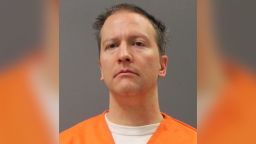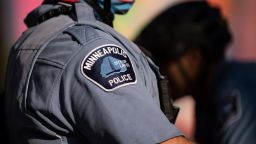Minneapolis residents on Tuesday rejected a ballot measure to overhaul policing drafted amid the national fury over George Floyd’s murder but that went to voters as concerns about rising gun violence drained energy from the protest movement that had launched it.
More than 56 percent of the 143,000 people voted on that question rejected the plan, which would have given the city council oversight of a new Department of Public Safety and done away with a requirement to employ a minimum number of police officers tied to the city’s population.
The status quo-affirming result is a setback to both citywide and national efforts to fundamentally reduce or eliminate the role of police in America. Voters rejected the drastic public safety proposal in favor of a more measured approach to public safety that consolidates power with the city’s mayor.
Talk of curbing police departments by cutting or limiting their resources has run into a countervailing wall of concern over public safety and waning support from early allies – including leading Democrats who largely view “defund the police” messaging as political poison.
Cities and states across the country have moved to tweak, alter, or overhaul the role of police in society since Floyd’s death under the knee of then-Minneapolis police officer Derek Chauvin. Because policing is such a locally controlled institution, those measures have differed widely by jurisdiction.
The vote marked a significant setback for activists dedicated to defunding or dismantling a police department that had for years been confronted with accusations of racism and the use of excessive force. Tuesday night was the first time voters in Minneapolis had the chance to weigh in on a concrete proposal to overhaul policing, and they rejected it by a 13% margin.
At least four city councilmembers who previously supported replacing the police department with a wider encompassing Department of Public Safety lost their elections Tuesday while at least six won either as incumbents, challengers, or filling vacant seats, according to unofficial results from the City of Minneapolis.
Mayor Jacob Frey, re-elected on Tuesday, said he wanted to ensure an integrated approach to public safety, hire more community-oriented officers, build safety beyond policing, and get serious about reform on a “multi-jurisdictional level.” But the public safety ballot measure, which would have given the city council shared oversight of the department, was not something he supported.
“This notion of having the head of public safety or the commissioner, whatever you want to call them, report to 14 different people, 13 council members and the Mayor. I didn’t think that was workable and clearly the majority of our city agreed,” he said. “The goal here is to bring multiple different entities into a consolidated approach. I think everybody agrees with that.”
Miski Noor, co-director of Black Visions, one of the groups at the center of the coalition that got the question on the ballot, said they were disappointed in the election results but that they are “so incredibly hopeful still. Forty-five percent is huge.”
Ultimately, 43.83 percent of people voted “yes” to the ballot question.
“It translates to over 60,000 people. That’s nothing to sneeze at,” they said. “We did what we came here to do in so many ways.”
Noor said they wanted Frey to participate in “authentic engagement, willingness to listen, instead of entrenchment in his own views.”
Barry Clegg, chairman of the commission that oversees Minneapolis government structure, said the vote was a referendum on public safety but also control of Minneapolis city government. Voters also gave the mayor greater control of the city by passing a separate ballot measure.
“Those council members who supported the public safety amendment and lived in a ward that supported the public safety amendment were reelected,” Clegg said. “Those who supported the public safety amendment and lived where it wasn’t supported were not reelected.”
Voters on both sides of the public safety measure agreed that the way Minneapolis police operate now is not acceptable. The question on the ballot posed one way of changing that, and voters found the plan to give control of public safety related departments to the city council and eliminate the requirement to employ police officers unacceptable.
“Proponents of (the ballot measure), the burden was on them to demonstrate to voters they had an implementable vision that addressed aspects of policing and public safety important to Minneopolitans,” said Leili Fatehi, spokeswoman for the campaign opposed to the measure. “They did not do that. They did not present and amendment that changed the way police are recruited, changed the way they’re disciplined, changed the way they’re held accountable. It didn’t do any of those things. That’s ultimately why people rejected a vague hope for restructuring without specificity.”
Minneapolis City Councilmember Phillipe Cunningham, who spearheaded a similar ballot initiative, called the results “really unfortunate.” He lost his seat to a challenger Tuesday.
“We have just seen a clear backlash to progress in our city,” said Cunningham.
Floyd’s murder on Memorial Day in 2020, captured on video by a bystander and the video went viral on social media, set off a tinderbox. In response to protests that drew national attention, Minneapolis city councilors gathered in a city park and pledged to dismantle the police department.
Frey was confronted outside his home in June 2020, shortly after Floyd’s murder, and jeered when he refused to commit to abolishing the police department – a much more ambitious step than was proposed in the ballot initiative on Tuesday. A day after Frey’s confrontation with protesters, nine members of the city council announced plans to begin “the process of ending the Minneapolis Police Department.”
“We committed to dismantling policing as we know it in the city of Minneapolis and to rebuild with our community a new model of public safety that actually keeps our community safe,” Council President Lisa Bender told CNN at the time.
Weeks later, the council voted unanimously to begin a process that would dismantle the police department and replace it with a “department of community safety and violence prevention.”
The move was greeted by activists who, as surges of anger pulsed through cities (and even some suburbs), saw an opportunity to realize reforms that had previously been viewed as impossible. What followed was almost 18 months of litigation and other fights through city bureaucracy about the scope of possible change, largely because of a constitution-like document governing the city’s structure and the police department’s role that is not easy to change.
Despite the measure’s failure on Tuesday, proponents hope city officials will take into consideration the thousands of voters who signed a petition to get the measure on the ballot and who voted for its passage.
“We didn’t lose the campaign because our vision for expanded public safety was radical, we lost because (opponents) repeated the same vision and told people they could deliver it without structural change,” said JaNaé Bates, spokeswoman for the “Yes” campaign. “Attaching to that lie and selling it to folks is frustrating, but it does make me proud to know we have expanded the conversation in Minneapolis, that policing and public safety are not synonymous.”
The question on the ballot Tuesday, of whether to do away with the Minneapolis Police Department and replace it with a Department of Public Safety, resulted from a petition drive following Floyd’s murder.
More people cast their ballots early this year than any other Minneapolis election in 45 years. Early voting was up 143% compared to the 2017 municipal election, and up 488% compared to the 2013 municipal election. By about five hours into Election Day, about 30% of registered voters had cast a ballot early, by mail, or in person.
CNN’s Gregory Krieg contributed to this report.




